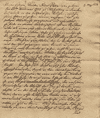 Anna Caritas (d. 1755)
Anna Caritas (d. 1755)

|
|
|
Anna Caritas, Indian. The wife of our Negro brother Joseph concluded her earthly life at midday. She was otherwise called Nanny and was born in North Carolina not very far from our land. Both her parents were Shawnees. Her mother was captured by the Mohawks and taken to Carolina and went down there with her, but died soon thereafter. The blessed sister was raised by her own [biological] sister, nourished on the milk and flesh of gourds, and after that she was taken to Wyomik where she came among white people. She spent much time there and after the death of her first husband she moved there to be with them. She was here for half a year before Bethlehem was built. And when, after a while, she inquired about good people she was again drawn here. At that time she had heard all sorts of rumors about Bethlehem, both good and bad, and she was eager to see the people about whom she had heard such varying reports. She came here in the year 47 and, because she saw nothing other than good, she resolved to stay here. She went right to the laundry and helped the sisters with the washing. We didn’t know what she intended and when one sister said to her that we couldn’t give her money for her work and that we didn’t need a laundry maid she gave this answer: "I would like to stay here. I cannot be idle and I do not know how to spin. I don’t require any money as long as I only have my meals." The sisters came to be fond of her, beseeched the Savior on her behalf, and also told her about the Savior’s love for the Indians. At first this seemed to have no effect, but it did touch her heart and finally, of her own accord, she began to attend the worship services. Her brother had threatened to kill her if she remained among the white people, and in fact he did come here and speak to her. However, he did nothing to her and she was glad that he went away again. After that she was married to our Negro brother Joseph and moved with him to Friedrickstown, where she gave true and diligent service to the school that was there at the time. She continued to show these characteristics wherever she was. In the year 48, on November 21, she was baptized into the death of Jesus by Brother Johannes at the belated celebration in Friedrickstown of the Festival of the Chief Eldership. And since then she has gone ahead in her quiet way with blessing, done what she could with all faithfulness, and was loved tenderly. When the war troubles started here she was lodged with the Sisters, but she soon moved back in with her husband, explaining the reason with a friendly countenance: She didnŐt want to disturb the sisters with her coughing. Soon thereafter she was laid up in bed, but in her sickness she was as still and patient as a lamb. On the Lord’s Day, as on the "Great Day" (as she called it), she was very downcast because she believed that Communion had already been held and that she had missed it. When someone told her, though, that she could still expect it she was very happy and could hardly wait. Very early on December 28 she asked whether the horns would not play soon announcing the Lord’s Supper. And when the Sick Communion was brought to her she said [in English]: "I am very glad, that you are come." She spend the remaining days quietly and in contentment and expressed her thankfulness that the Savior had brought her to Bethlehem and she said that she desired now to go to Him. Shortly before her departure on December 31 she said: "Now I am ready, now I will soon go to the Savior." [And in English]: "God bless you!" This was accompanied by a sense of uncommon blessing. There were German as well as Indian sisters sitting with her and they sang her lovely little German and Indian verses. At the stanza O Side-Crevice I ask you especially to keep her eternally. Now she goes to the congregation, etc. Sister Anna Maria Werner blessed her for her rest. She is now at peace and was the first of the Shawanees to go to the Eternal Hills as a believer. Hallelujah! Her corpse was buried in our God’s Acre on January 3, 1756 by Brother Schmick, accompanied by the Indian and other brothers and sisters.
Transcription & translation by Otto Dreydoppel, Jr.
